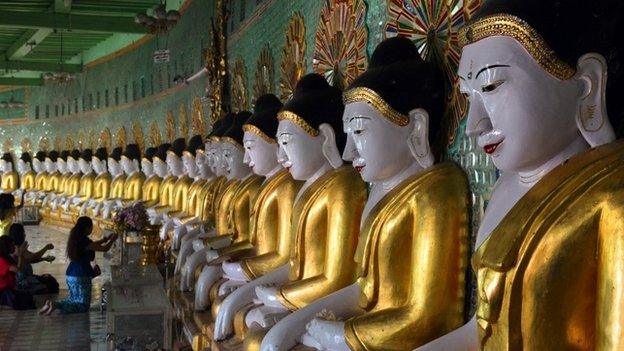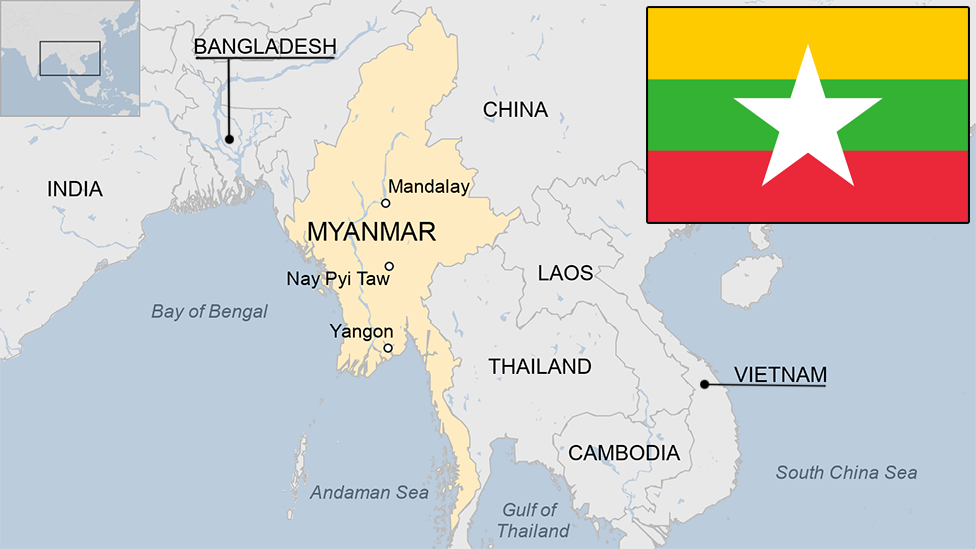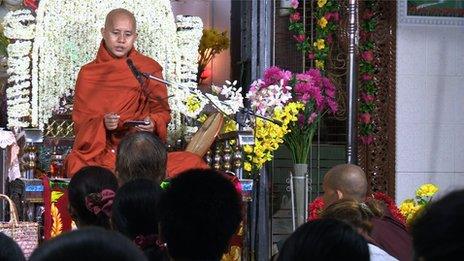Myanmar court finds trio guilty of insulting religion
- Published
Philip Blackwood: "It's more than the maximum sentence"
A New Zealander and two Burmese men have been found guilty of insulting religion in Myanmar over a poster promoting a drinks event depicting Buddha with headphones.
Philip Blackwood, who managed the VGastro Bar in Yangon, was arrested in December along with bar owner Tun Thurein and colleague Htut Ko Ko Lwin.
They have each been sentenced to two and a half years in jail.
Burmese law makes it illegal to insult or damage any religion.
The poster, which was posted on Facebook to advertise a cheap drinks night, showed Buddha surrounded by psychedelic colours. It sparked an angry response online.
Myanmar, also known as Burma, has seen growing Buddhist nationalism in recent years.
All three men had denied insulting religion during their trial. Tun Thurein told the court that Blackwood alone was responsible for the posting. Blackwood had said sorry online and repeated his apology in court.

About 90% of Myanmar's population is Buddhist and perceived insults to the religion are taken seriously

The three convicted men emerged from court to be confronted by a media scrum
But the judge, Ye Lwin, said that though Blackwood apologised, he had "intentionally plotted to insult religious belief" when he uploaded the poster on Facebook, reported AFP news agency.
Blackwood, 32, said he planned to appeal against the sentence.
Speaking after sentencing outside the court before being bundled into a car, he said that he was "pretty disappointed" with his punishment, which was "more than the maximum sentence".
"I have said that I was sorry so many times," he said. "It was nothing to do with me."
Before sentencing he said that he had removed the image and posted an apology when he realised it was being shared online and provoking outrage.
The New Zealander's family say they hope the government will intervene to deport him.
Blackwood's lawyer, Mya Tway, was careful with his assessment of the ruling which has been welcomed by some Buddhist groups.
"It will be difficult to say whether this verdict is fair or not because this is Myanmar, not like other democratic countries. That's all I can say," he said.
Human Rights Watch Deputy Asia Director Phil Robertson said that the three men acted in a culturally insensitive way but should not have been sent to prison.
"By using the Religion Act to criminalise these three individuals, rather than accepting an apology and dealing with it in another way, the government is, sort of, setting up more witch hunts against persons that these Buddhist groups view as being insulting to their religion," he said.
Mr Robertson said that freedom of expression in Myanmar is under greater threat than ever as the country heads into a pivotal election year.
While free speech in Myanmar has improved under the country's semi-civilian government, Buddhist nationalism has been on the rise in recent years, with extremist monks such as Wirathu growing in popularity. At the same time and Muslim minorities have been targeted, particularly in Rakhine state.
About 90% of Myanmar's population is Buddhist.
- Published18 December 2014

- Published2 May 2013
.jpg)
- Published26 May 2023

- Published29 August 2013
